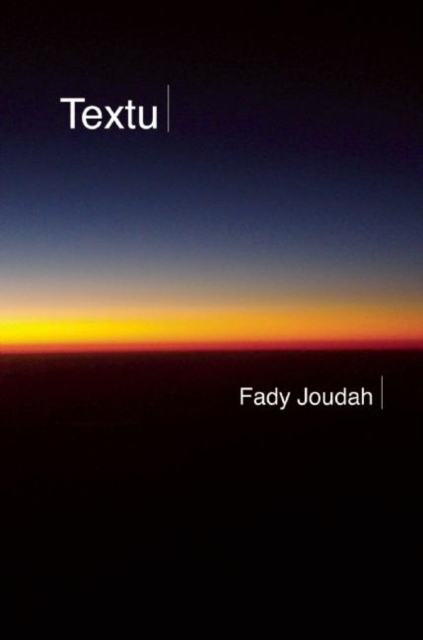Textu

Textu
Joudah's poetry thrives on dramatic shifts in perspective, on continually challenging received notions.--The GuardianEmerging in the era of tweets and text messages, poet Fady Joudah has invented a new poetic form: textu. The u in textu echoes the one in haiku, and also emphasizes the intimate you. A textu poem has a single rule: be exactly 160 characters long. As theme, form, and style are wide opened, a textu reveals new possibilities and poetry in unexpected ways.TextuYour spine a river into the forest
can't tell the neurons for the treesI light & light
you up with sound profilethreading the image habit
of pleasureConscienceWhen we learn how an infant in the womb
Sleeps precisely in a parent's posesay with fist closed
pillowing the templeWhat will become
of the poemA collection of poems that takes its form from the text message necessarily raises similar questions about attention, and attendant questions about empathy. Each poem in Fady Joudah's Textu was composed on a smart phone's text message screen, and is "exactly 160 characters long, specific to text message parameters." Aren't text messages the epitome of what we glance at in passing, and then just as quickly forget, in that often-described stream of information and stimulation?This book is not a reductive critique of this stream, or what it is doing to us. Neither does the collection let its premise--the textu form--justify itself without inquiry, as though shaping a poem according to the strictures of a text message necessarily makes the poem interesting. Instead, the form feels central to these poems, and to what they are doing. Joudah has pointed out that for most people in the world who can't afford unlimited texting, exceeding the character count means incurring additional costs; the character is a unit of economic value. The constraint of character count in the book, then, is not only a new kind of meter. It is also a metonym for the ways in which our language and our relationships are constrained by the world in which we live: by taking their form from one born of late capitalism, the text message, what these poems implicitly suggest is that all of our communication--and all of our poems--are shaped by this system, whether we would prefer to hold our attention on this fact or not.It is fitting, then, that even as Textu asks us to consider the context in which lyric poems are made, it draws on and locates itself within the lyric tradition. The textu form shares the ly
PRP: 101.32 Lei
Acesta este Prețul Recomandat de Producător. Prețul de vânzare al produsului este afișat mai jos.
91.19Lei
91.19Lei
101.32 LeiLivrare in 2-4 saptamani
Descrierea produsului
Joudah's poetry thrives on dramatic shifts in perspective, on continually challenging received notions.--The GuardianEmerging in the era of tweets and text messages, poet Fady Joudah has invented a new poetic form: textu. The u in textu echoes the one in haiku, and also emphasizes the intimate you. A textu poem has a single rule: be exactly 160 characters long. As theme, form, and style are wide opened, a textu reveals new possibilities and poetry in unexpected ways.TextuYour spine a river into the forest
can't tell the neurons for the treesI light & light
you up with sound profilethreading the image habit
of pleasureConscienceWhen we learn how an infant in the womb
Sleeps precisely in a parent's posesay with fist closed
pillowing the templeWhat will become
of the poemA collection of poems that takes its form from the text message necessarily raises similar questions about attention, and attendant questions about empathy. Each poem in Fady Joudah's Textu was composed on a smart phone's text message screen, and is "exactly 160 characters long, specific to text message parameters." Aren't text messages the epitome of what we glance at in passing, and then just as quickly forget, in that often-described stream of information and stimulation?This book is not a reductive critique of this stream, or what it is doing to us. Neither does the collection let its premise--the textu form--justify itself without inquiry, as though shaping a poem according to the strictures of a text message necessarily makes the poem interesting. Instead, the form feels central to these poems, and to what they are doing. Joudah has pointed out that for most people in the world who can't afford unlimited texting, exceeding the character count means incurring additional costs; the character is a unit of economic value. The constraint of character count in the book, then, is not only a new kind of meter. It is also a metonym for the ways in which our language and our relationships are constrained by the world in which we live: by taking their form from one born of late capitalism, the text message, what these poems implicitly suggest is that all of our communication--and all of our poems--are shaped by this system, whether we would prefer to hold our attention on this fact or not.It is fitting, then, that even as Textu asks us to consider the context in which lyric poems are made, it draws on and locates itself within the lyric tradition. The textu form shares the ly
Detaliile produsului










